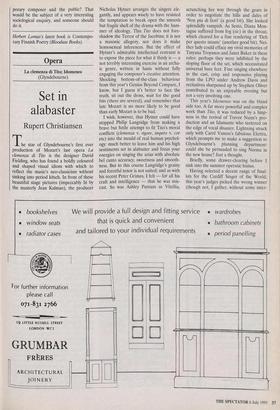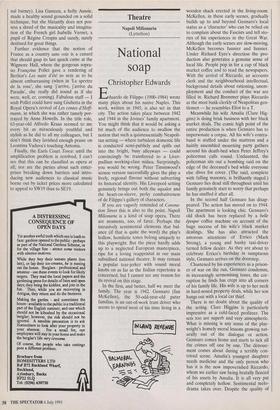Opera
Set in alabaster
Rupert Christiansen
The star of Glyndebourne's first ever production of Mozart's last opera La clemenza di Tito is the designer David Fielding, who has found a boldly coloured and shaped visual idiom with which to reflect the music's neo-classicism without sinking into period kitsch. In front of these beautiful stage pictures (impeccably lit by the masterly Jean Kalman), the producer Nicholas Hytner arranges the singers ele- gantly, and appears wisely to have resisted the temptation to break open the smooth but fragile shell of the drama with the ham- mer of ideology. This Tito does not fore- shadow the Terror of the Jacobins; it is not a masonic allegory, nor does it make homosexual inferences. But the effect of Hytner's admirable intellectual restraint is to expose the piece for what it thinly is — a not terribly interesting exercise in an archa- ic genre, written in haste without fully engaging the composer's creative attention. Shocking bottom-of-the-class behaviour from this year's Genius Beyond Compare, I know, but I guess it's better to face the truth, sit out the dross, wait for the good bits (there are several), and remember that late Mozart is no more likely to be good than early Mozart is to be bad.
I wish, however, that Hytner could have stopped Philip Langridge from making a brave but futile attempt to fit Tito's moral conflicts (clemenza v. rigore, impero v. cor etc) into the mould of real human psychol- ogy: much better to leave him and his high sentiments set in alabaster and focus your energies on singing the arias with absolute bel canto accuracy, sweetness and smooth- ness. But to this course Langridge's grainy and forceful tenor is not suited; and as with his recent Peter Grimes, I felt — for all his craft and intelligence — that he was mis- cast. So was Ashley Putnam as Vitellia, scrunching her way through the gears in order to negotiate the hills and dales of Non piu di fiori' (a good bit). She looked splendidly vampish. As Sesto, Diana Mon- tague suffered from fog (sic) in the throat, which cleared for a fine rendering of `Deh per questo istante' (another good bit). Nei- ther lady could efface my vivid memories of Tatyana Troyanos and Janet Baker in these roles: perhaps they were inhibited by the sloping floor of the set, which necessitated universal bare feet. Fine singing elsewhere in the cast, crisp and responsive playing from the LPO under Andrew Davis and recitatives sharpened up by Stephen Oliver contributed to an enjoyable evening but not a very involving one.
This year's ldomeneo was on the bland side too. A far more powerful and complex work than Tito, it was reduced by a limp- ness in the revival of Trevor Nunn's pro- duction and an Idamante who teetered on the edge of vocal disaster. Lightning struck only with Carol Vaness's fabulous Elettra, which prompts me to make a suggestion to Glyndebourne's planning department: could she be persuaded to sing Norma in the new house? Just a thought.
Briefly, some drawer-clearing before I sink into the summer operatic hiatus.
Having selected a decent range of final- ists for the Cardiff Singer of the World, this year's judges picked the wrong winner (though not, I gather, without some inter- nal Barney). Lisa Gasteen, a hefty Aussie, made a healthy sound grounded on a solid technique, but she blatantly does not pos- sess a shred of the musicality and imagina- tion of the French girl Isabelle Vernet, a pupil of Regine Crespin and surely, surely destined for great things.
Further evidence that the notion of France as a country sans voix is a canard that should gasp its last quack came at the Wigmore Hall, where the gorgeous sopra- no Francoise Pollet gave a rendering of Berlioz's Les nulls d'ete so sexy as to be almost embarrassing (when in 'Le spectre de la rose', she sang `j'arrive, j'arrive du Paradis', she really did sound as if she were, well, er, coming). Fabulous stuff — I wish Pollet could have sung Giulietta in the Royal Opera's revival of Les comes d'Hoff- mann, in which she was rather tamely por- trayed by Anne Howells. In the title role, 63-year-old Alfredo Kraus seemed to me every bit as miraculously youthful and stylish as he did to all my colleagues, but I don't think they lavished enough praise on Leontina Vaduva's touching Antonia.
Finally, the Earls Court Tosca: until the amplification problem is resolved, I can't see that this can be classified as opera at all; nor are the pieties about such enter- prises breaking down barriers and intro- ducing new audiences to classical music borne out by ticket prices more calculated to appeal to SW19 than to SE19.



















































 Previous page
Previous page